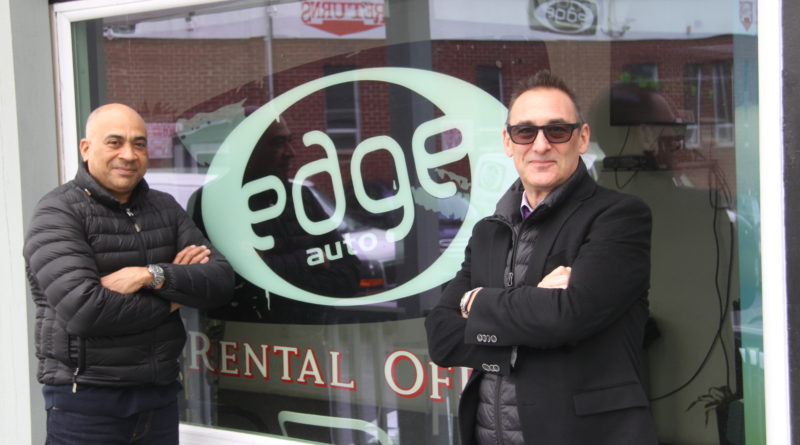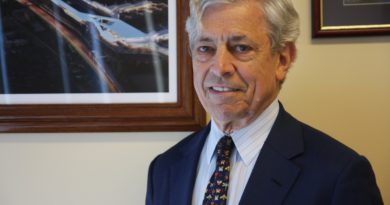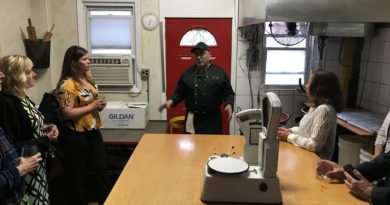Edge Auto Rental prepares for new challenges
Company founders discuss space, film tax and the community
BY BENJAMIN FANG
When Rudy Callegari and William Harris founded Edge Auto Rental in 2006, they started the company as a solution to companies looking to rent vehicles.
Unlike most car rental companies, which focus on individuals, Edge sought to cater to the needs of businesses with a varied fleet. With small passenger cars, SUVs, vans and tractor trailers, the company became a one-stop shop for vehicles.
“We have stuff that manufacturers don’t even make,” Harris said. “Whatever your business is, we for sure have the vehicle for you.”
Callegari said the company takes pride in providing what their clients require. When the United Nations comes in and asks for 50 black SUVs, Edge has it. If a movie set requires 30 different types of cars, they will provide it.
“We will give you exactly what you’ve asked for,” he said.
Edge was first located in Chelsea near Hudson Yards. As the area developed, the co-founders realized they needed to move.
They decided to open locations in Greenpoint and Astoria, two boroughs where the owners have roots.

According to Harris, one of the company’s biggest challenges is the dearth of space. Car rental businesses need to park their cars, he said, but there are fewer and fewer lots that fit their needs.
“Our challenge specifically is because of the variety of vehicles we have,” he said. “We can operate out of a parking lot with cars and some vans, but how do you operate a truck or tractor trailer?”
As the city slowly moves away from a car-first mentality and toward measures like congestion pricing, Edge’s leaders said they still find that companies prefer to move their employees or services with vehicles.
“If thy need to be in Midtown with 50 of their employees, they’re going to pay whatever the city asks as a tax,” Callegari said.
“Our customers, I think, will continue going into the city and will still continue to do their business,” Harris added. “It will be an additional expense to them.”
They predicted that as land becomes more and more valuable in New York City, the company will continue to get pushed further and further away from Manhattan. Businesses will just have to adjust along the way.
“We thought it would be suicide coming out of Manhattan, that’s not what we saw,” Harris said. “We were able to operate better, we were able to free up more space.”
Callegari said as long as it’s happening to all businesses, Edge should be able to adjust and adapt.
“Like all smart business people, you have to be ahead of what’s going to happen,” he said. “We foresaw what was going on in Chelsea and we moved out of there long before we had to. We’ll do the same here when the time comes.”
Another potential issue moving forward is how the state handles the renewal of the film tax credit. Callegari noted that Edge does a lot of work with the entertainment business.
He said the tax credit helps bring many companies into New York to film, generating millions of dollars in taxes and business for the local economy.
“It’s been proven time and again that the benefits outweigh the credit itself,” he said. “That needs to continue.”
The generated economic activity helps small businesses that are not directly involved in the tax credit. The pizzeria down the block from a set or the local gas station, for example, will make money from increased activity.
With the film industry providing more than 50 percent of their business, Harris said they were able to grow their car rental company to a staff of over 70 people because of the tax credits.
Take away the credits, and they’ll be forced to cut down to 10 employees within a month, he said.
“I cannot stress the tax credits enough,” he said. “This should not go anywhere.”
Callegari and Harris recently joined the North Brooklyn Chamber of Commerce. They’re also members of the Queens and Brooklyn chambers of commerce, and participated in their respective lobbying days in Albany.
Edge’s owners said they want to become advocates for small businesses, which they believe are the “lifelines” for most people in the city.
Callegari said they could have gone to Westchester or Long Island and probably made more money, but it’s not in their DNA to leave New York City.
“We love the fact that we’re fortunate enough to do business here,” he said. “We want to do everything we can to help keep that going.”




